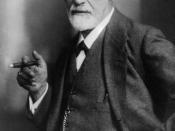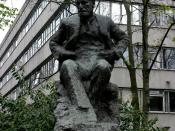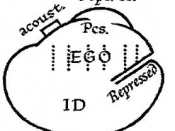Describe and critically evaluate the Psychoanalytic approach to Psychology.
Sigmund Freud was born in Frieberg, Moravia in 1856, but when he was four years old, his family moved to Vienna. Freud introduced the 'psychoanalytic approach' to therapy known as 'Psychoanalysis' to the world. In the early 1900's, Freud studied people and their neurotic disorders. He developed his own way of treating these disorders, this was known as 'Free Association'. (Hayes 1994)
The concept of Free-Association is the name given to what happened when a patient looks at particular images and expresses in their own words what each picture means to them, no matter how out of the ordinary. He also noticed that minor slips of the tongue (this is where the term 'Freudian slips' comes from) could also be monitored, as this was also part of the unconscious mind. Freud believed that Free-Association often revealed hidden memories from childhood experiences.
The patient would have difficulty remembering this experience, but by use of Free Association, he would encourage the patient to remember this and help them come to terms with it (Walmsley 2003).
Freud received criticism from many other psychologists, most notably Eysenck. Eysenck surveyed numerous reports related to Freud's psychotherapy experiments and compared them to results from 'Eclectic Therapy'. He concluded:
"There appears to be an inverse correlation between recovery rate and psychotherapy; the more psychotherapy received, the smaller the recovery rate" (Walmsley 2003).
It is widely argued that Freud's methods are not very reliable. His theories cannot be proved wrong so cannot be classed as scientific theories. But he only used mentally ill patients in his experiments, so they cannot be proved right either. His theory is based on only a very small group of people (Hayes, 1990). Therefore, the question of the therapeutic effectiveness of psychoanalysis remains an...



Interesting.
i haven't studied psychology at this depth yet, but this is a well written essay with great insight.
0 out of 0 people found this comment useful.